The British Pound is on the Offensive as a Complacent Market Wakes from Interest Rate Slumber
- Written by: James Skinner
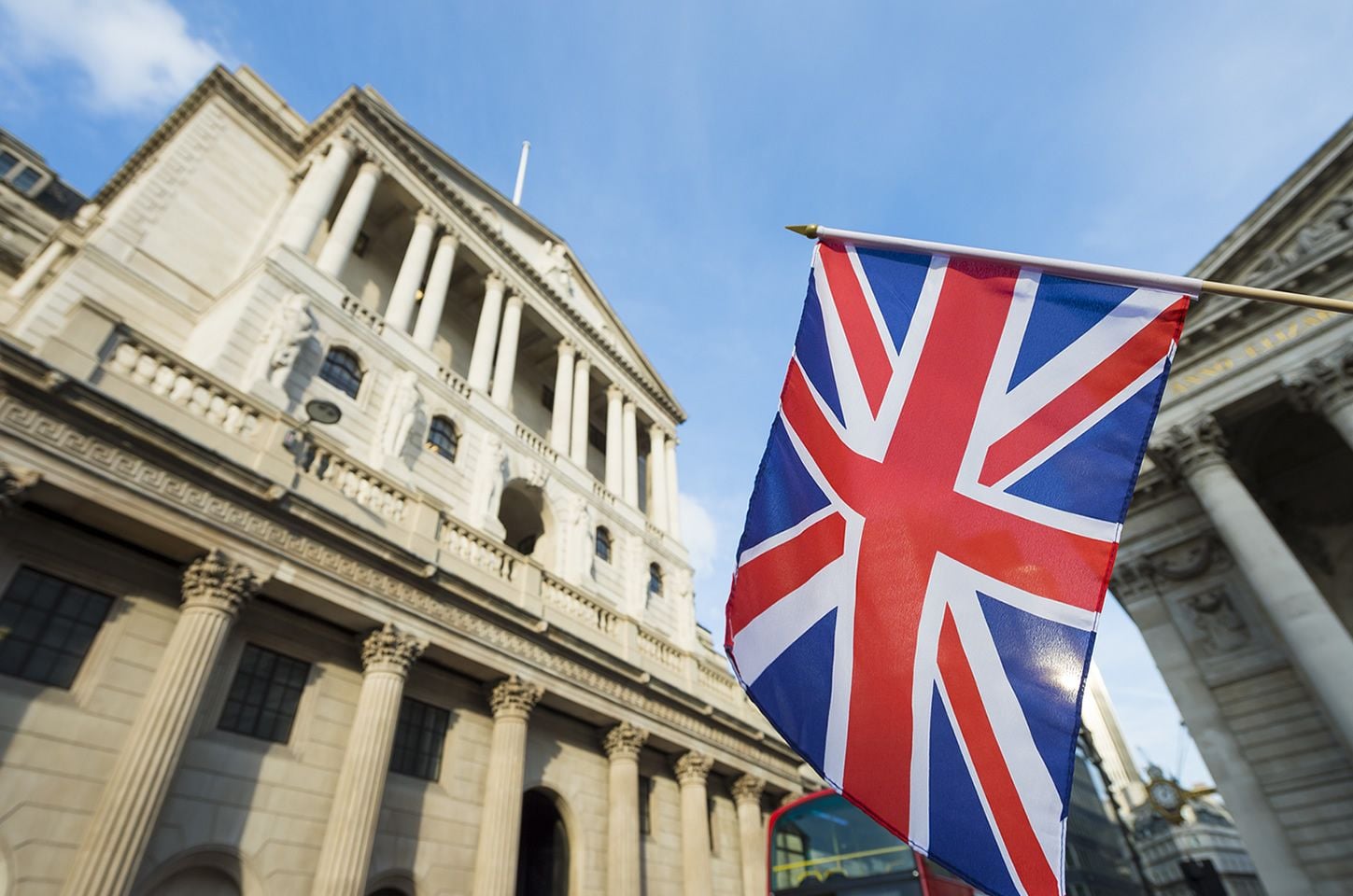
© lazyllama, Adobe Stock
- GBP enters May month on offensive ahead of BoE, amid Brexit chatter.
- BoE is now almost the only game in town for yield-hungry investors.
- Analysts say BoE to stick with rate hike pledge this week, aiding GBP.
The Pound is the on the offensive this week, already having gained 1.3% over the Dollar and half a percent from the Euro, as investors are increasingly woken from a complacent slumber at the currency market wheel.
G10 central banks have dropped like flies this year, abandoning earlier commitments to lifting interest rates over the coming quarters, and concurrently the market's belief in Bank of England (BoE) claims that it's committed to raising Bank Rate "at a gradual pace and to a limited extent" has wained.
However, as the Bank of England's 12:00 Thursday policy decision and statement loom over the market, analysts have begun to contemplate the odds of the BoE following in the footsteps of its developed world counterparts and are increasingly coming to the conclusion that it'll do no such thing.
"Before raising rates again the BoE would probably prefer to wait until Brexit is resolved to avoid adding to the current climate of uncertainty. It might not have that luxury, however," warns Kallum Pickering, an economist at Berenberg, in a note to clients Monday. "On Thursday BoE Governor Mark Carney may hint at another hike as soon as August, even if Brexit remains unresolved."
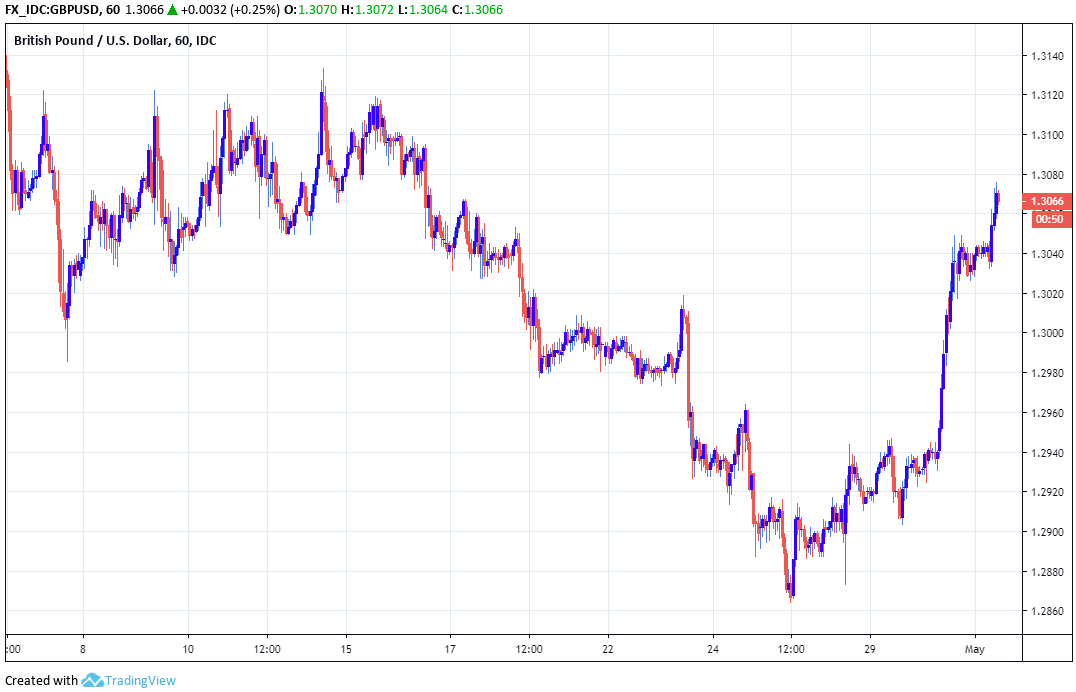
Above: Pound-to-Dollar rate shown at hourly intervals.
Pickering's Monday missive is typical of the briefings that banks and brokers have been giving to clients throughout the current week and could explain in substantial part why Pound Sterling has suddenly found a Northern wind in its sails once again.
And with that in mind, it should come as no surprise that pricing in the overnight-index-swap market has shifted in a Pound-favourable direction over the 48 hours into Wednesday's session, with investors having gone from contemplating interest rate cuts this summer to betting on another rate hike before year-end.
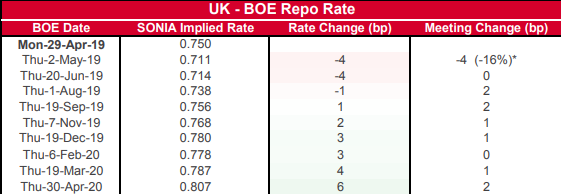
Above: Market expectations of UK bank rate on April 29, 2019. Source: Westpac Institutional Banking.
Around the time Pickering's breifing went out on Monday morning, the market-implied Bank Rate for August 01, 2019 was just 0.73% and the December 19, 2019 rate was just 0.78%. But by Wednesday morning the implied rate for those dates had shifted upward to 0.75% and 0.80%.
This means the Bank of England is now becoming the only game in town for yield-hungy investors, given there are no longer any other G7 central banks offering hope of the improved bond market returns that almost always accompany higher benchmark interest rates, which could continue to act as a powerful stimulant for the Pound.
The BoE is close to becoming the only game in the G10 town too because as much as both Swedish and Norwegian central banks have hiked rates in recent quarters, declining inflation is now sidelining the Riksbank, leaving Norges Bank as the only other to give serious consideration to rate hikes for 2019.
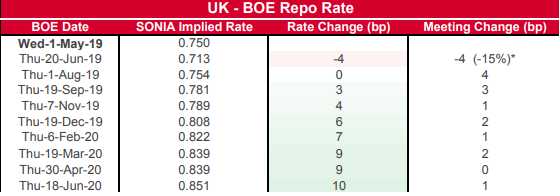
Above: Market expectations of UK bank rate on May 01, 2019. Source: Westpac Institutional Banking.
BoE policymakers have said repeatedly over the last 18 months that they need to raise interest rates in order to prevent the consumer price index rising meaningfully above the 2% target in the years ahead but financial markets have until recently assigned almost a zero percent probability to the prospect of a rate hike coming in 2019.
However, and especially after considering the uncertainty resulting from the Brexit pantomime in the UK parliament, the performance of the UK economy has been relatively good and is likely to have gotten the attention of an inflation-fearing Bank of England.
Economic output rose by a total of 0.7% in the first two months of the year, which is even faster than the 0.6% pace of growth seen through the whole of the third quarter of 2018 and puts the economy on course for its best quarter since the period spanning April to July 2015.
Meanwhile, the UK unemployment rate has fallen to a new post-1973 low of 3.9% and wages are growing at their fastest pace in nominal terms since before the financial crisis. Pay adjusted for inflation is also growing at a healthy clip and nurturing economist fears of even higher inflation further down the line.
"Household spending remains a bright spot along with the labour market, while confidence and businesses’ risk appetites remain soft. On Thursday the BoE may nudge its projection for unemployment down 0.1-0.2ppt over the forecast horizon while keeping the inflation and GDP outlook mostly unchanged," Pickering says.
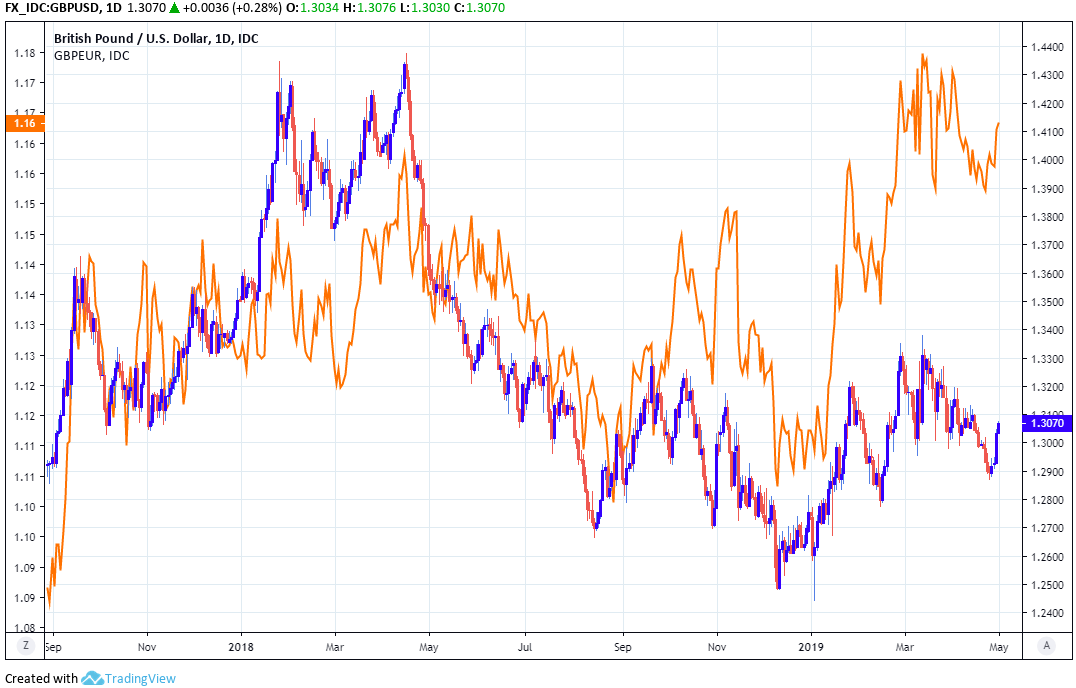
Above: Pound-to-Dollar (red and blue) and Pound-to-Euro (orange) rates at daily intervals.
Pound Sterling may well have received newfound support from a market reappraisal of the interest rate outlook in recent days but that's not been the only supportive factor to have shown up on the radar of investors.
Reports surfaced this week suggesting Prime Minister Theresa May is on the cusp of a breakthrough in talks with the opposition Labour Party about how best to get her preferred model of EU exit through the House of Commons.
There are no guarantees that an eventual agreement between the government and opposition will be enough to move PM May's contentious withdrawal agreement through the House of Commons given that such a pact could well result in increased numbers of bacbench MPs voting against their own government.
If the PM manages to lose more of her own MPs than she gains from the opposition through the unprecendented and consensus-seeking talks with a Labour Party that's under equal fire from its own membership, albeit for different reasons, then nothing will have been solved thus far.
The Prime Minister has until October 31 at the very latest to get her withdrawal agreement ratified, which requires approval by both houses of parliament and Royal Assent as well as a series of other legislative acts, or she will face a choice between requesting from the EU a further extension of the Article 50 period and going for a so-called 'no deal Brexit' that most market pundits say would be economically damaging.
Time to move your money? Get 3-5% more currency than your bank would offer by using the services of foreign exchange specialists at RationalFX. A specialist broker can deliver you an exchange rate closer to the real market rate, thereby saving you substantial quantities of currency. Find out more here.
* Advertisement




